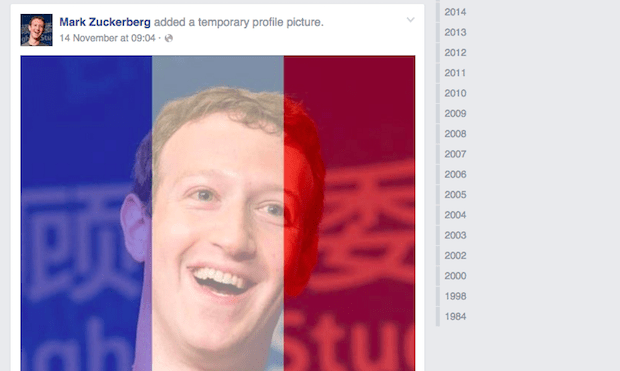Robert Frost famously defined poetry as the moment when emotion finds thought, and the thought finds words. But in the era of social media, who needs words? As several million Brits have been discovering this week, there is a way of showing your emotional sympathy with the French. Simply put a Tricolore filter on your Facebook page. A simple, free and wordless way of advertising your feelings to the world.
At first glance, this trend falls into the grand tradition of fatuous social media trends like #refugeeswelcome, #nomakeupselfie and Ice Bucket Challenges, where people make sure that they are the centre of attention (and looking suspiciously good while they’re at it) while water is being emptied over their heads. An easy way to advertise one’s compassionate, thoughtful credentials with just the click of a button – and an awful example of the emotional incontinence induced by our digital age.
But, then again, haven’t we always offered small gestures to commemorate sad events? Or to show respect? Why do we buy poppies in November, and feel under-dressed without them? Why do we wear black to funerals? Or attend candlelit vigils? What about writing tributes to someone in the death notices of a newspaper, or on a plaque on a bench? The flags flown at half mast, the lit beacons on the hills – are they also the sign of a nation sick with emotional overload? And, if not, is it so bad to add a flag of a country in mourning to your Facebook profile?
When my friends on Facebook (though of course, it being Facebook, some of them aren’t really friends at all) started turning into French flags, I had similar reactions. It’s just virtue-signalling, I muttered to myself, recalling this rather amusing Daily Mash article about people feeling anxious that they’d removed the Pride filter from their Facebook profile photos too early and would now be considered homophobes. But then again, perhaps, the enamel poppy I bought from a young soldier at Westminster underground station a few weeks ago was virtue-signalling, too.
James Bartholomew, who first wrote about ‘virtue-signalling’ in the Spectator, explained that it’s something you do to tell other people how great you are. That’s different to trying, imperfectly, to show that you’re sorry that something happened. Perhaps it’s the difference between writing a pompous blog about ‘why I’m not wearing a poppy this year’ and quietly buying one from someone at a station, or quietly not buying one at all.
Similarly, the difference, I think, between posting a picture of your face with no make up on for ‘breast cancer awareness’, and a little Tricolore over a photo, is that the former is all about you, all about your face, all about how brave you, a healthy young thing (possibly still wearing a little bit of concealer here and a small dash of mascara there) are to bare your face in public. That’s vanity. Covering your face with a French flag: less so.
At least the #nomakeupselfie raised money for charity, though, while the #refugeeswelcome hashtag requires no more effort than typing a tweet. You didn’t actually need to show how you’d make those refugees welcome, or indeed what you were already doing for those already here and who often live quite miserable and lonely lives. Instead, you could just show people how great and kind you were without any of the difficulties of actually being kind. Perhaps that’s why so many of the kindest people don’t bang on about it, partly because they realise that putting yourself out for someone else is often unglamorous, tiring, and inconvenient.
In the world of social media, outrage is a commodity in plentiful supply. It makes us all into critics – it is a massive festival of millions of Brits opening windows into their lives, for the world to look in. To ‘share’ what they’re thinking and feeling, in a way they never would if they met people on the street. It’s a strange world, but also one that lets us keep in touch with old friends and forgotten relatives. But the more there is to see, the more there is to disapprove of.
And this, also, is the trap. Just as there is nothing particularly admirable about trying to make every news event or sad story all about you, and your emotion, there is nothing admirable about being so cynical that you see bad (or crass) in everyone. It can coarsen the heart, and blunt our ability to be generous and forgive our friends for being as conflicted in their motives as we are.
And yes, I did end up adding a French flag to my own Facebook picture. It took a click. It doesn’t mean much, and it won’t help anyone. But what is worse: showing a little solidarity, or sneering at others?







Comments